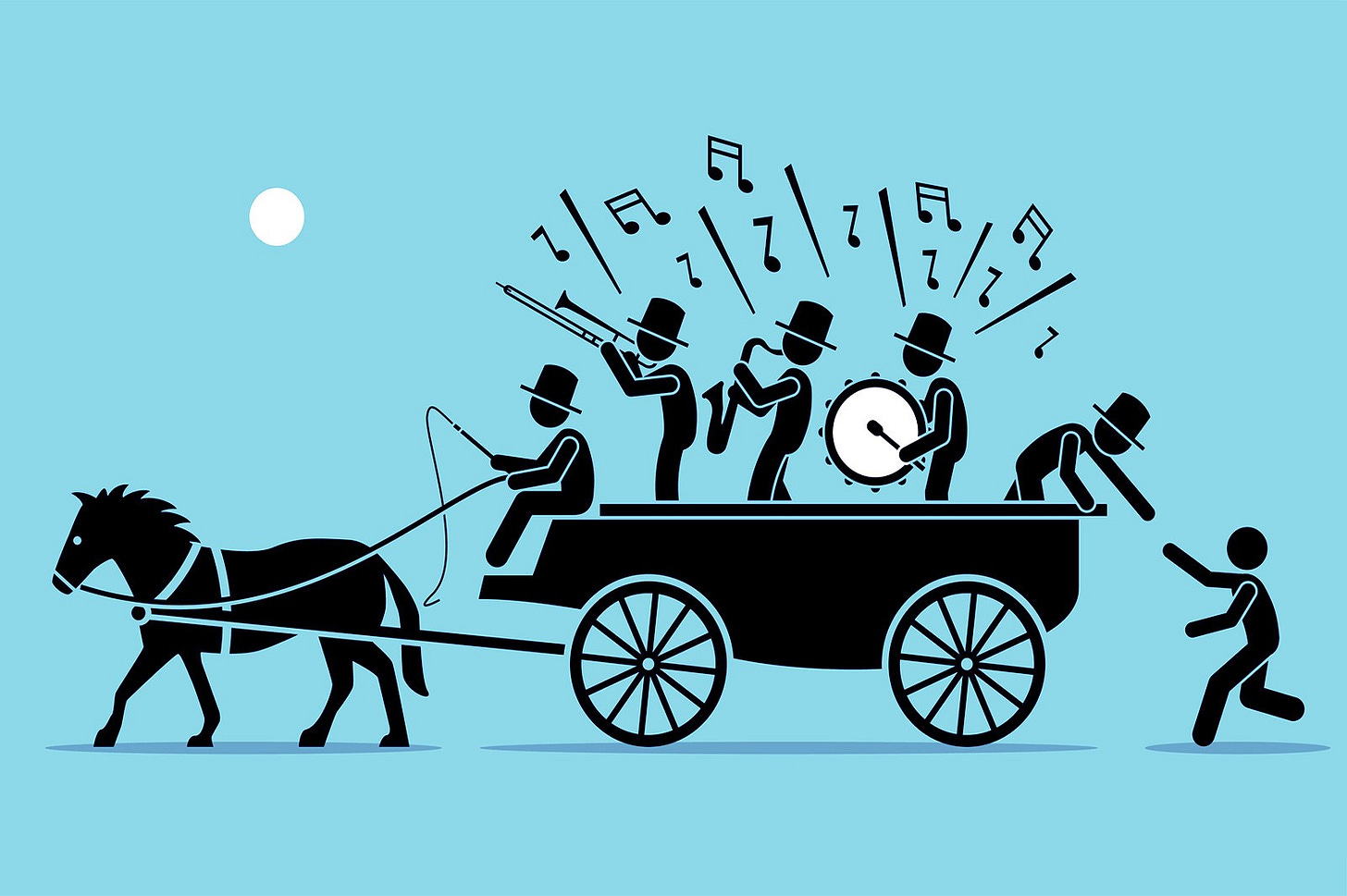I’m a copycat 🙀 — Bandwagon effect
Social media trends, groupthink vs expertise, and how to use bandwagon effect for self growth.
In case you’re heading out to watch the movie Minions: The Rise of Gru, you’re in for an off-screen surprise. You are likely to come across a bunch of teens dressed up in suits🤵🏻🤵🏻♀️, sometimes even a banana in their breast pocket!
It’s all thanks to the social media challenge #Gentleminions. It encourages teens to dress up in their best suits to match the yellow, bubbly characters, the Minions.
We all know someone who’s always ‘updated’ with the trends. They wear only what’s in fashion. They follow influencers up close. They know the hottest TikTok memes. Their life rolls in Insta reels.
They don’t have personal likes or dislikes. They like what’s trending, they despise what’s outdated. They are the people who are suffer from the Bandwagon effect.
In 1948, Dan Rice, a famous circus clown at the time, came up with a new and innovative way to support a political campaign. He used his eye-catching, music-playing bandwagon to grab the attention of the voters.
As the bandwagon marched on the streets, people were encouraged to hop on. Soon, more people would jump on. The idea was such a super hit that other politicians copied it for their political campaigns.
By 1990, the term Bandwagon effect earned a bad reputation. It described people associating themselves with something only because of its success.
The mental mistake of acting or behaving in a certain way just because everyone else is doing it is called the Bandwagon effect.
You and I don’t jump on the physical bandwagon on the streets. But we are guilty of drooling over the latest smartwatch, shoes, clothes, or whatever else your guilty pleasure might be.
A classic example of the bandwagon effect is picking a crowded restaurant/bar over an empty one. I’m guilty for sure 🙋🏻♀.
Maybe there’s nothing wrong with the food and service in the empty restaurant. Maybe when both the places were empty, a group of friends randomly picked one. Everyone else just followed!
It’s a maybe of course. But why risk it? Why pick a dull place over a bustling one?!
While picking a popular venue does make sense, there are times when we shut our minds and blindly follow the crowd.
While crossing a road, for example, people tend to simply tail other pedestrians. Why take the pain to look up at the traffic light🚦🙃!
Our world is full of products that were in a rage all thanks to the bandwagon effect.
Take Crocs, for example, one of the most hideous shoes ever made. Now they come in all sorts of designs. But when they were launched, they were plain ugly. Why would people pick the worst-looking, rigid, holes-on-the-top, expensive shoes?
Fidget spinners were designed to help children with ADHD and autism. But the trend to spin the toy caught on with all kids. And also with some restless adults 😀.
A pop-it is another fidget that grabbed the attention of all kids. Even I enjoyed popping the pop-its as my kids would bring one in their goodie bag from every other birthday party. This was on top of their personal collection.
When it comes to following trends, it’s mostly kids or teens—that’s what we like to think 🤔.
Like everyone else, I too, think that I don’t suffer from the bandwagon effect. Neither does my family. Over the years, we made decisions that didn’t follow the norm. We quit our corporate jobs. All our friends and family at that time were 9 to 5ers. Our kids left their ‘proper’ school for homeschooling. All their friends go to school.
So yes, we do have a thing or two to prove to our minds that we don’t blindly follow conventions. That might be true. But the reality is that no one is spared from the bandwagon effect.
At least at some point in your life, you must have done something just because others are doing it.
We check out the Amazon reviews before picking a product.
We pick a book because it says New York Times Bestseller on its cover.
“If you only read the books that everyone else is reading, you can only think what everyone else is thinking.”
— Haruki Murakami
What most people are doing must be right is how we feel.
As it turns out, popular opinions don’t guarantee smart decisions.
Groupthink versus expertise
Wirecutter is a product review website owned by New York Times. Their review products related to tech, home, garden, kitchen, etc., and offer advice and deals. How’s that different from Amazon reviews?
While Amazon reviews are based on public opinion, Wirecutter reviews are based on research and testing conducted by experts. They’d recommend you a product even if it’s not a best seller.
e.g., best hangers recommendations from professional home organizers, best knifes recommendations from the best chefs, and so on.
Sometimes, it’s wise to rely on expertise than groupthink. Especially when the stakes are high.
The same principle applies in professional settings. When multiple stakeholders are involved, teams rely on voting to make crucial decisions. Just because everyone got a vote doesn’t mean it’s best for the business.
On the contrary, it leads to mediocre decisions. Then why are we copycats?
Why copy others?
There are pros and cons to following others.
Researching, comparing options, and decision-making takes a lot of brain power. Going with the popular opinion saves us from elaborate research each time we need to pick a dining place, which shows to watch next on Netflix/Disney/Apple TV, or even to decide whether to go with Netflix, Disney, or Apple TV, etc 😅
Plus we are social beings. We like to conform. We desire to feel included.
We align our beliefs and behavior with those of the group even though they don’t match our individual beliefs and behavior.
People feel less confident if their beliefs don’t match those of others like them.
Following the herd mentality is a con when success depends on having a unique point of view. e.g. while building a business, product, etc.
All of us are guilty of following the norm at one point or the other.
Maybe you pretended to be busy at your workstation because all of your colleagues looked super busy. Maybe you joined a particular college/university/course because others were doing it. Maybe you picked an industry to work in because it felt cool at the moment. Maybe you enrolled your kids in a school just because all your friends were sending theirs to that school.
What if the work that you’re doing isn’t something that interests you? If you live for the weekends, maybe it’s time to make weekdays better. If your kid isn’t blooming in the popular school, maybe it’s time to change to a less popular one.
How to use the bandwagon effect for self-growth?
While we can’t stop it entirely, we can benefit from the bandwagon effect by surrounding ourselves with people we admire. Both online and offline.
To become a better runner, run with fast runners. To become a better writer, write for the best publications. To become stronger, work out with the pros.
“You're the average of the five people spend the most time with.”
— Jim Rohn
Surround yourself with people whom you admire, who inspire you, and who can help you grow.












Wirecutter is new information.......will try them.